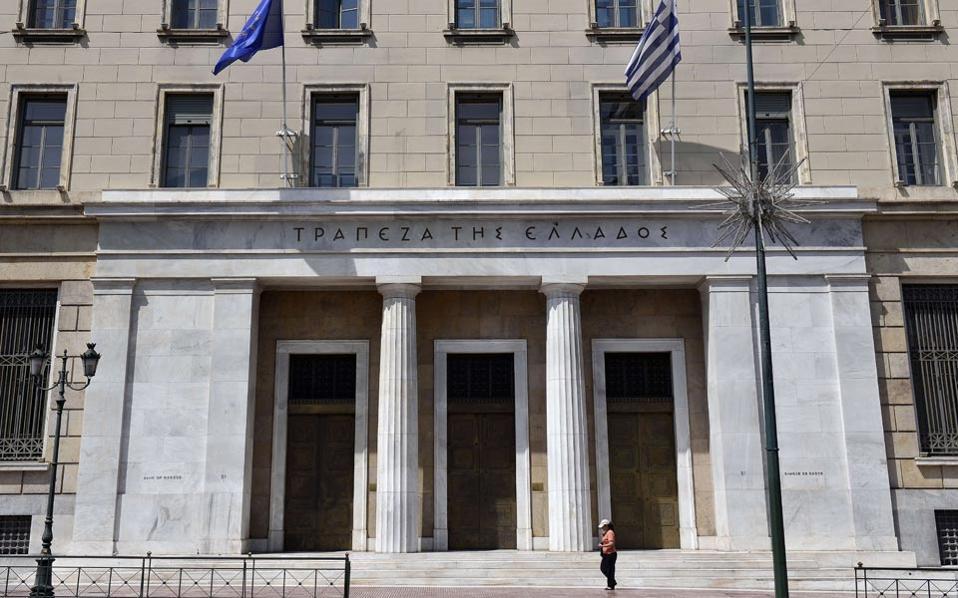
The Bank of Greece headquarters in Athens.
On August 20, 2018, Greece left its third bailout program.
REUTERS/Costas Baltas
For once Europe has an exit to celebrate rather than dread. On Monday, more than eight years after its first euro zone bailout, Greece left its third financial rescue program.
This is a welcome Grexit, but before popping open the champagne it’s important to remember that Athens remains in thrall to its European creditors, who have failed to put the Greek economy on a sustainable footing.
This is a welcome Grexit, but before popping open the champagne it’s important to remember that Athens remains in thrall to its European creditors, who have failed to put the Greek economy on a sustainable footing.
Just three years ago, Greece’s amicable departure from any bailout program would have seemed unimaginable. In the first half of 2015, brinkmanship by Alexis Tsipras’s newly-elected radical-left government nearly precipitated a disastrous Grexit from the monetary union.
After a hastily-called referendum delivered a resounding rejection of creditors’ terms for further assistance, Germany initially pressed for Greece’s temporary ejection from the euro zone. With Greek banks already shut down, Tsipras ultimately folded, agreeing to sweeping new reforms. But even then the future of the new deal seemed uncertain.Greece and the euro zone dodged the worst of the possible outcomes that loomed during their extraordinary clash in 2015. But the fault lines remain. The euro area was desperate to avoid a fracturing of the currency union; any exit at all would call into question the supposed irrevocability of the euro, prompting financial markets to bet against other struggling economies. On the other hand, there had to be some way of disciplining a country that sought to exploit this underlying flaw.
After a hastily-called referendum delivered a resounding rejection of creditors’ terms for further assistance, Germany initially pressed for Greece’s temporary ejection from the euro zone. With Greek banks already shut down, Tsipras ultimately folded, agreeing to sweeping new reforms. But even then the future of the new deal seemed uncertain.Greece and the euro zone dodged the worst of the possible outcomes that loomed during their extraordinary clash in 2015. But the fault lines remain. The euro area was desperate to avoid a fracturing of the currency union; any exit at all would call into question the supposed irrevocability of the euro, prompting financial markets to bet against other struggling economies. On the other hand, there had to be some way of disciplining a country that sought to exploit this underlying flaw.
That flaw arose because the euro area was supposed to be a monetary union pure and simple, without any fiscal ties or support. This wishful thinking did not survive its first reality check when Greece lost access to the financial markets in the spring of 2010. Euro zone countries hastily discarded the “no bailout” edict in the 1992 Maastricht Treaty setting out the ground rules for the single currency. In a convenient legal reinterpretation of the treaty, bailouts turned out to be possible after all – as long as they took the form of loans rather than outright cuts in debt.
That is the source of Greece’s continuing plight. Though the country is emerging from the bailout program, it remains beholden to its euro zone creditors and the huge loans they have made. These account for the lion’s share of its towering public debt which, at 180 percent of GDP, is the highest in Europe. (Only Japan has higher debt as a share of GDP but, in a crucial contrast with Greece, Japanese themselves – rather than foreign creditors – hold the bulk of it.)
High public debt makes countries vulnerable to the whims of markets. They must be on their best behavior to ensure access to private sources of funds, and even then they can fall foul of mood swings when investors lose their appetite for risk. No longer shielded by the bailout program, Greece will have to tap markets again to refinance its existing debt as official loans mature. That is why, in an ideal world, Greece would leave its third bailout with much lower debt, through a direct reduction in the face value of the euro zone loans...[...]follow up here:

Δεν υπάρχουν σχόλια:
Δημοσίευση σχολίου